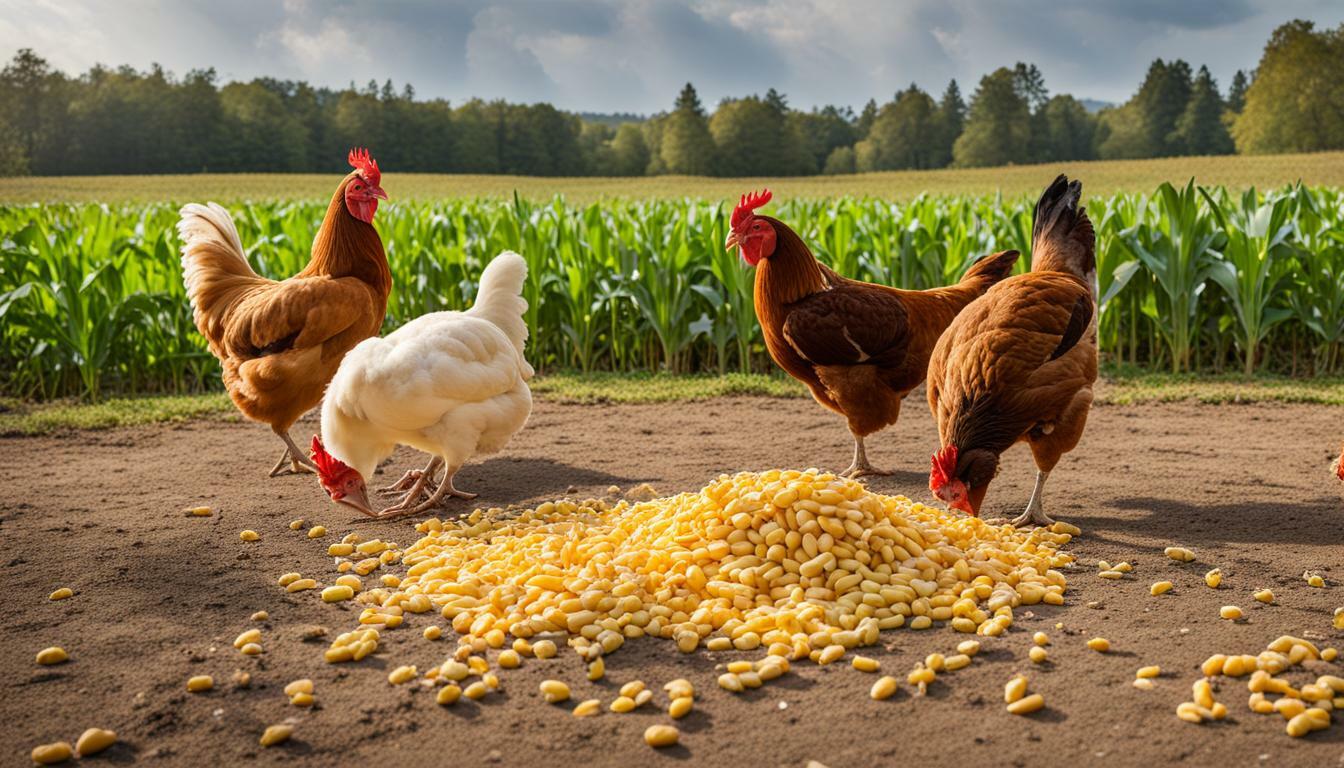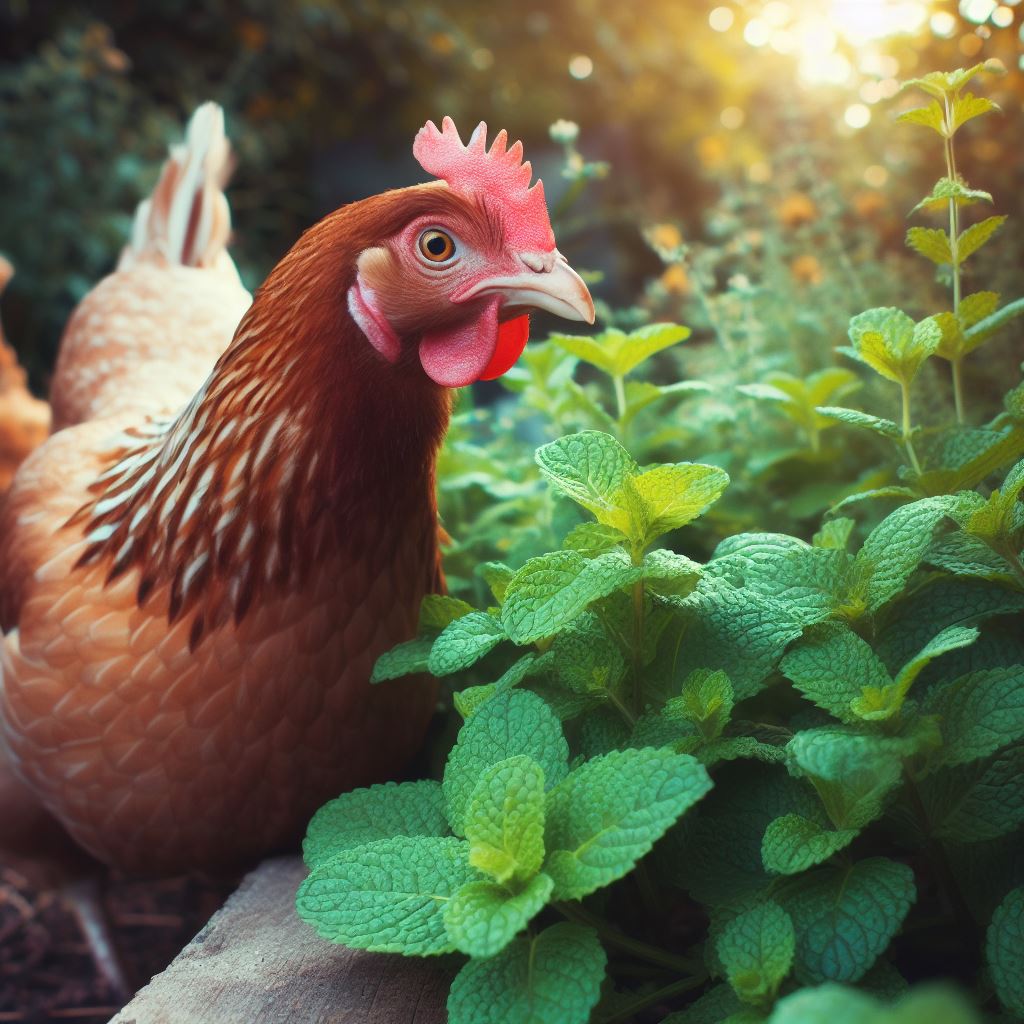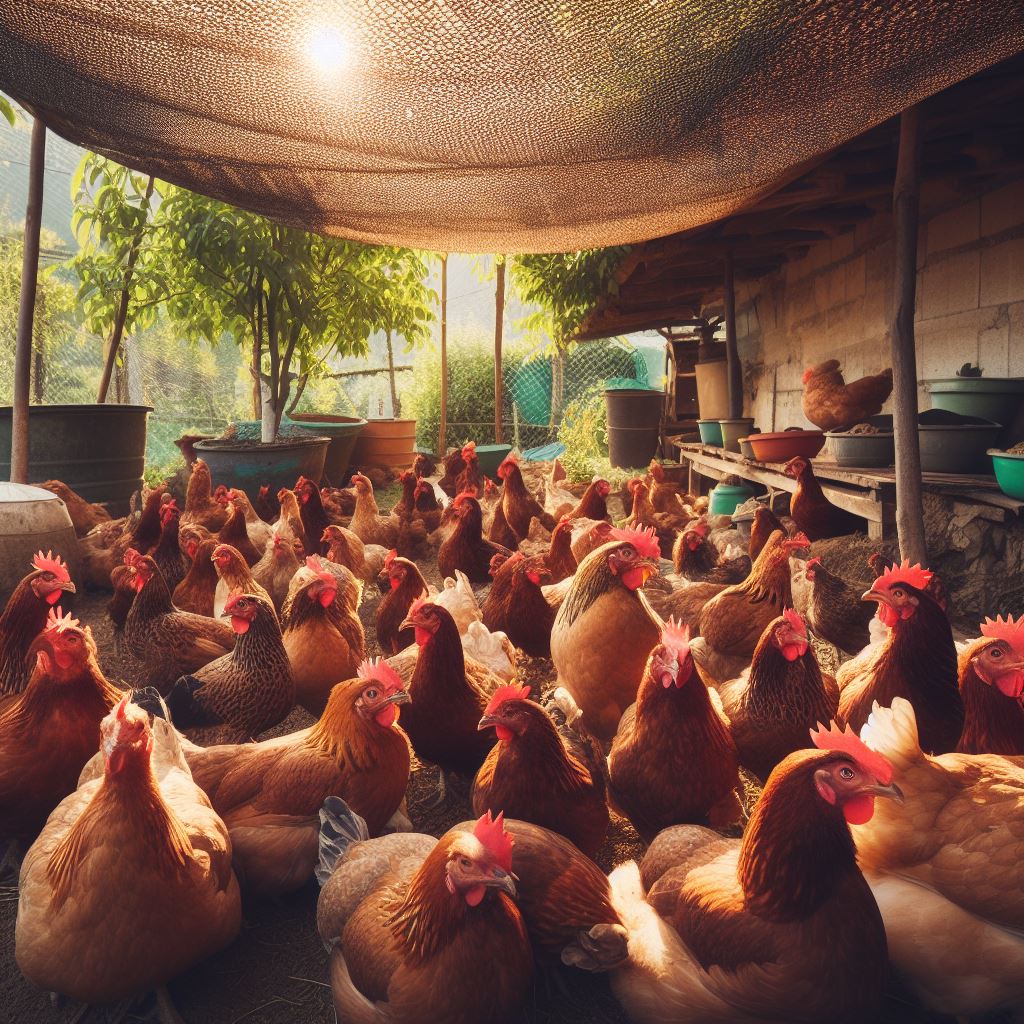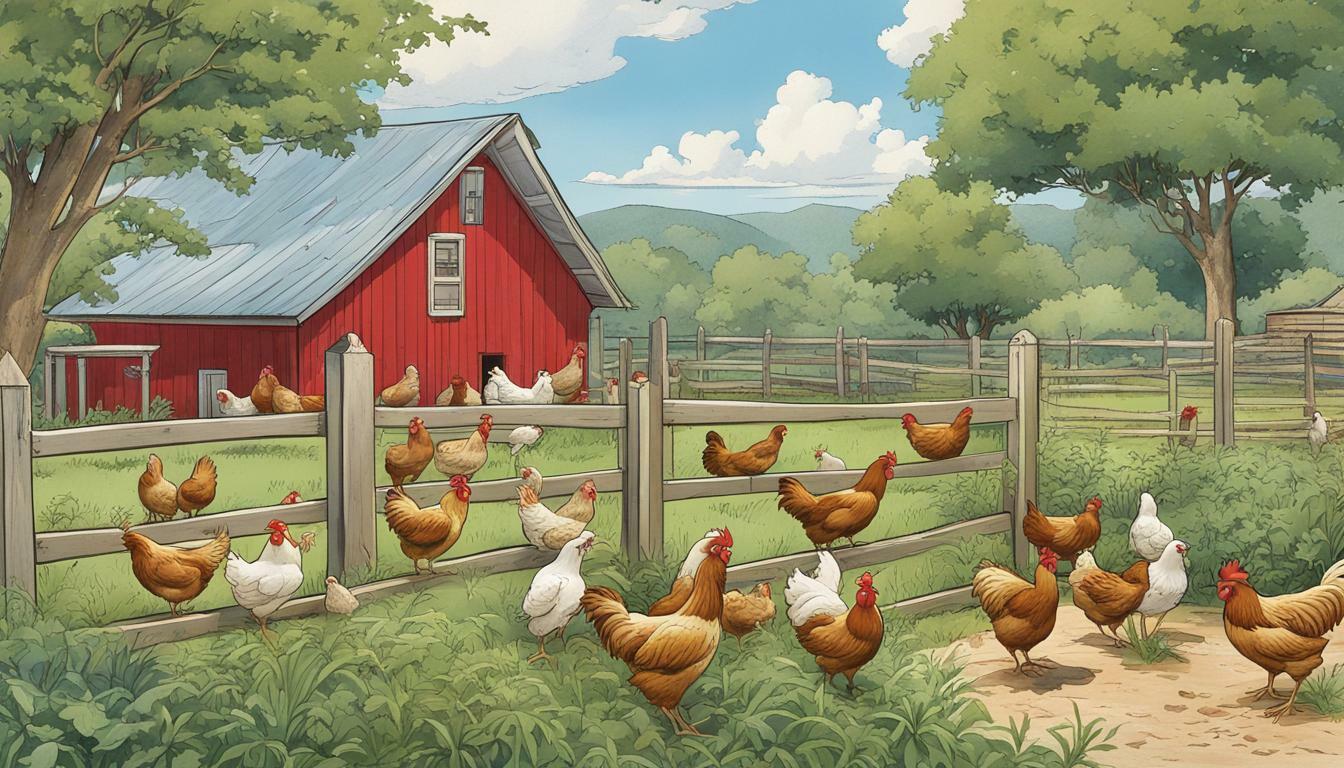Can Chickens Eat Deer Corn?

Table of content:
- Is Deer Corn Safe For Chickens?
- How Much Deer Corn Can Chickens Eat?
- Nutritional Benefits Of Deer Corn For Chickens
- Health Risks Of Chickens Eating Too Much Deer Corn
- Can Deer Corn Be Fed As a Main Food Source?
- Should Deer Corn Be Limited Or Fed Free Choice?
- Should You Prepare Deer Corn Before Feeding?
- How Often Can Chickens Have Deer Corn?
- Is Deer Corn A Healthy Treat Or Regular Diet?
- Are There Any Other Risks With Feeding Deer Corn?
- Conclusion
- Final Thoughts
Deer corn is a common supplemental feed used by hunters to attract deer. But if you also keep backyard chickens, you may be wondering if it’s safe to let your flock eat the leftovers. In this article, we’ll dive into the details of feeding deer corn to chickens.
Is Deer Corn Safe For Chickens?
The short answer is yes, deer corn is safe for chickens to consume in moderation. Deer corn is simply dried shelled corn, which is a grain chickens are well adapted to eat.
However, there are some important factors to consider before tossing your deer corn to the flock:
Nutritional Content
Deer corn is nutritionally balanced as an energy supplement for deer. However chickens have different nutritional needs.
Deer corn is high in carbohydrates but lower in protein, which chickens require for egg production and growth. It’s also deficient in necessary vitamins and minerals chickens need.
So deer corn shouldn’t comprise the bulk of a chicken’s diet. It lacks complete nutrition for long-term health.
Whole Grains Versus Cracked Corn
Most deer corn today is cracked, processed corn. This makes it easier for deer to digest.
But cracked corn can pose risks for chickens:
- The starches are rapidly digested, which can cause digestive upset.
- Cracked kernels may contain mold, toxins, or fungus.
- The sharp edges of broken kernels may irritate a chicken’s crop and gizzard.
Whole corn kernels are safer options. The outer hull provides protection through the digestive tract.
Risk Of Choking
Another risk of deer corn is potential choking hazards:
- Smaller cracked kernels can lodge in a chicken’s throat. This is especially dangerous for baby chicks.
- Eating too quickly from excitement over treated foods like corn increases choking risk.
- Whole corn kernels can also get stuck in a chicken’s crop. This can prevent them from eating other food.
To reduce chances of choking, crush or grind corn into smaller pieces. And supervise treatment time to ensure slow, steady eating.
So while deer corn isn’t toxic, it doesn’t provide complete nutrition. And the potential for digestive issues, mold/toxins, and choking should be considered before feeding it.
How Much Deer Corn Can Chickens Eat?
While safe in moderation, deer corn should be limited in a chicken’s diet. No more than 5-10% of their total daily feed.
Chickens have a natural appetite for corn and will eat more than what is healthy if given free access. Limit treat amounts to a handful per chicken, 1-2 times per week.
Here are some guidelines on amounts based on chicken age:
Baby Chicks
- Chicks under 4 weeks old shouldn’t eat whole corn kernels due to choking risk.
- Consider crushed corn in very small amounts – no more than 1-2 pieces per chick, 1-2x/week.
- Focus their diet instead on a complete chick starter feed.
Pullets/Layers (4 weeks – 1 year old)
- Up to 1 tablespoon of corn 2-3 times per week.
Adult Chickens
- 1-3 tablespoons of corn, 1-2 times per week.
- Free-range chickens finding whole kernels in the yard is fine. But don’t deliberately overfeed.
Roosters
- Roosters can eat the same amount of corn as hens of the same size and age.
Monitor your flock’s weight and egg production when offering corn. Reduce amounts if you see a drop due to overindulging in the treat.
Nutritional Benefits Of Deer Corn For Chickens
While deer corn shouldn’t be a dietary staple, in moderation it does provide some nutritional value:
Energy
The carbohydrates in corn deliver quick energy. This can be beneficial during high energy demand times like winter or the annual molt.
A handful of corn allows chickens extra calories for warmth and energy when it’s cold. Or to regrow feathers faster during a molt.
Vitamins & Minerals
While corn is low in protein, it does contain some B vitamins like niacin, riboflavin, and thiamine. It also provides vitamin C, phosphorus, and magnesium.
So small amounts can contribute to a chicken’s complete nutritional needs when their main feed may be lacking.
Digestion
The fiber in whole corn kernels can promote good digestion and crop emptying. This may benefit chickens prone to crop stasis issues.
The grittiness of whole corn can also help mature a baby chick’s gizzard as they transition to adult food around 6-8 weeks old.
Treat Food
As a special “treat” food, limited corn can be a nice change of pace from a chicken’s typical feed. This adds some variety to enrich their eating experience.
Health Risks Of Chickens Eating Too Much Deer Corn
The main risks come from chickens overindulging in corn if given free access. When overeaten, corn can contribute to the following health issues:
Obesity
The high calorie and carb content causes chickens to easily gain weight. Obesity stresses the hen’s liver and overall health.
Obese hens are also prone to prolapse and egg-laying issues.
Digestive Problems
Excess corn in the diet can irritate the digestive tract. Problems like crop impaction, diarrhea, and cloacal prolapse can occur.
Too much corn too fast also disrupts digestion of other feed. This limits absorption of necessary protein and nutrients.
Nutritional Deficiencies
Corn is low in calcium, protein, vitamins A, D, E, and some B vitamins chickens need.
Overfilling on corn means chickens eat less of their complete feed. Deficiencies can cause issues like thin eggshells, poor feathering, and low immunity.
Increased Choking Risk
Eating corn too quickly raises the chances corn kernels will get lodged in a chicken’s esophagus. This can lead to choking deaths.
Can Deer Corn Be Fed As a Main Food Source?
Deer corn lacks the necessary protein, amino acids, vitamins, and minerals required in a complete chicken feed.
While chickens will eagerly eat corn as their staple diet, their health will suffer.
Hens will experience problems like:
- Decreased egg production
- Loss of weight
- Poor feathering
- Increased mortality rates
Only feed deer corn as a supplement to a complete feed formulated to meet all of a chicken’s nutritional needs. Provide a quality layer, chick starter, or flock raiser feed as the foundation of their diet.
Should Deer Corn Be Limited Or Fed Free Choice?
For optimal health, corn should be limited in a chicken’s diet instead of offered free choice.
When available at all times, chickens tend to overeat corn. They like the sweet taste.
But allowing unlimited access can lead to the health issues mentioned earlier like obesity, malnutrition, and digestive upset.
Follow these tips for safe limited feeding:
- Feed corn as a treat or supplement no more than 1-2 times per week.
- Limit total amounts based on chicken size and age.
- Don’t replace or displace their complete feed. Corn should only comprise 5-10% of total food intake.
- To discourage overconsumption, spread corn out over a large area instead of a limited space.
- Don’t feed corn free choice or leave it available at all times.
Limited, supervised corn feeding reduces health risks while still offering a taste chickens enjoy.
Should You Prepare Deer Corn Before Feeding?
To maximize safety, it’s a good idea to take some steps to prepare deer corn before feeding:
Sort Through The Corn
- Discard any kernels that look discolored, moldy, or damaged.
- Pick out debris like sticks, leaves, bugs, mouse droppings, etc.
- Remove any vegetation like weeds, grass, or seeds mixed in.
Clean/Disinfect
- Rinse corn under water to remove dust and dirt.
- For extra precaution, soak in a mild bleach water solution. Use 1 teaspoon bleach per 1 quart water.
- Spread out corn and let it dry completely before storing or feeding.
Grind/Crush The Kernels
- For baby chicks, grind down kernels until crumbled and very small.
- Lightly crack whole kernels with a rolling pin for older chickens. This makes it easier to digest.
- Be careful not to create a fine powder or meal.
These steps reduce risks of mold, bacteria, and choking hazards.
How Often Can Chickens Have Deer Corn?
For adult chickens, 1-2 times per week is reasonable for corn supplementation. For younger chickens, offer corn even less frequently:
- Chicks under 4 weeks – Avoid whole corn. Consider crushed bits just 1-2 times total for a treat.
- Pullets up to 1 year – 1 tablespoon of corn 2-3 times per week maximum.
Monitor your flock’s weight, eggs, and droppings. Reduce corn frequency if you notice issues like diarrhea, weight gain, or other signs of digestive upset.
Work corn into their diet slowly if chickens aren’t accustomed to it. Gradually increase amounts as you evaluate impacts on health and egg production.
Finding the optimal corn feeding frequency for your flock takes observation and adjustment. Start conservatively and increase slowly from there.
Is Deer Corn A Healthy Treat Or Regular Diet?
Deer corn should only be considered a supplemental treat food for chickens rather than a dietary staple.
While chickens relish corn, regular overconsumption can lead to health issues as detailed earlier.
For a healthy diet, choose a complete feed specially formulated for chickens according to their age and purpose (egg-laying, growth, etc.). This ensures balanced nutrition.
Then use corn as a supplemental treat in moderation just 1-2 times per week. About 1 tablespoon per chicken is a good treat portion.
Free ranging chickens eating some corn they find is fine. But don’t intentionally overfeed corn in place of their complete feed.
Are There Any Other Risks With Feeding Deer Corn?
Aside from the health risks already covered, here are a few other considerations:
Mold/Bacteria
Deer corn, especially if cracked or damaged, can contain mold, fungi, or bacteria if it gets wet or sits too long. This can cause illness.
Inspect corn and discard any visibly contaminated kernels before feeding.
Pests/Rodents
Corn can attract mice, rats, and other pests around the coop looking for an easy meal. Secure or remove extra corn in between feedings.
Predators
The strong scent of corn can draw predators like raccoons. Only feed small amounts that chickens can consume quickly.
Don’t leave corn accessible overnight. Secure the coop against predators before dusk.
Quality Decline
Corn that sits too long loses nutritional value. Feed fresh deer corn within a few months for highest quality.
With sound judgment, corn can be fed safely. But be cautious of health risks, pests, and predators to avoid problems.
Conclusion
Deer corn can offer some benefits as an occasional treat for backyard chickens. The energy, vitamins, minerals, and fiber contribute to their nutritional needs when fed in moderation.
Pay close attention to amounts, frequency, and chicken health. Limit corn to no more than 10% of the overall diet. Monitor for obesity, malnutrition, and other signs of excess feeding.
Avoid moldy, damaged corn. And don’t allow chickens free access. To prevent health issues, corn should be fed as a supplement only 1-2 times per week.
While chickens love corn, it lacks the key protein and nutrients they need in a complete feed formulated for poultry. So provide a quality complete feed as their dietary foundation instead of relying on deer corn.
With smart supplementation, deer corn can be enjoyed safely by chickens as an occasional treat. But it shouldn’t become a staple component of their daily menu.
Final Thoughts
- Deer corn can be fed to chickens in moderation but shouldn’t be a primary food source. Limit to 1-2 times per week.
- Prepare corn by sorting, cleaning, and grinding kernels down for baby chicks. Take steps to reduce risks.
- Monitor chicken weight and egg laying. Reduce corn amounts if you notice a drop in production.
- Allow 1-2 tablespoons per chicken, adjusting amounts based on age. Avoid free-choice feeding.
- Supplement with a nutrient-balanced complete feed for optimal health. Corn lacks key proteins and vitamins chickens need.
- Be cautious of risks like obesity, malnutrition, and increased choking hazards.
- With smart, limited supplementation, deer corn can provide a safe, healthy treat chickens enjoy.
Welcome. I’m Adreena Shanum, the proud owner of this website, and I am incredibly passionate about animals, especially poultry. I founded adreenapets.com as a labor of love, stemming from my desire to share my knowledge and experiences with poultry enthusiasts worldwide.




